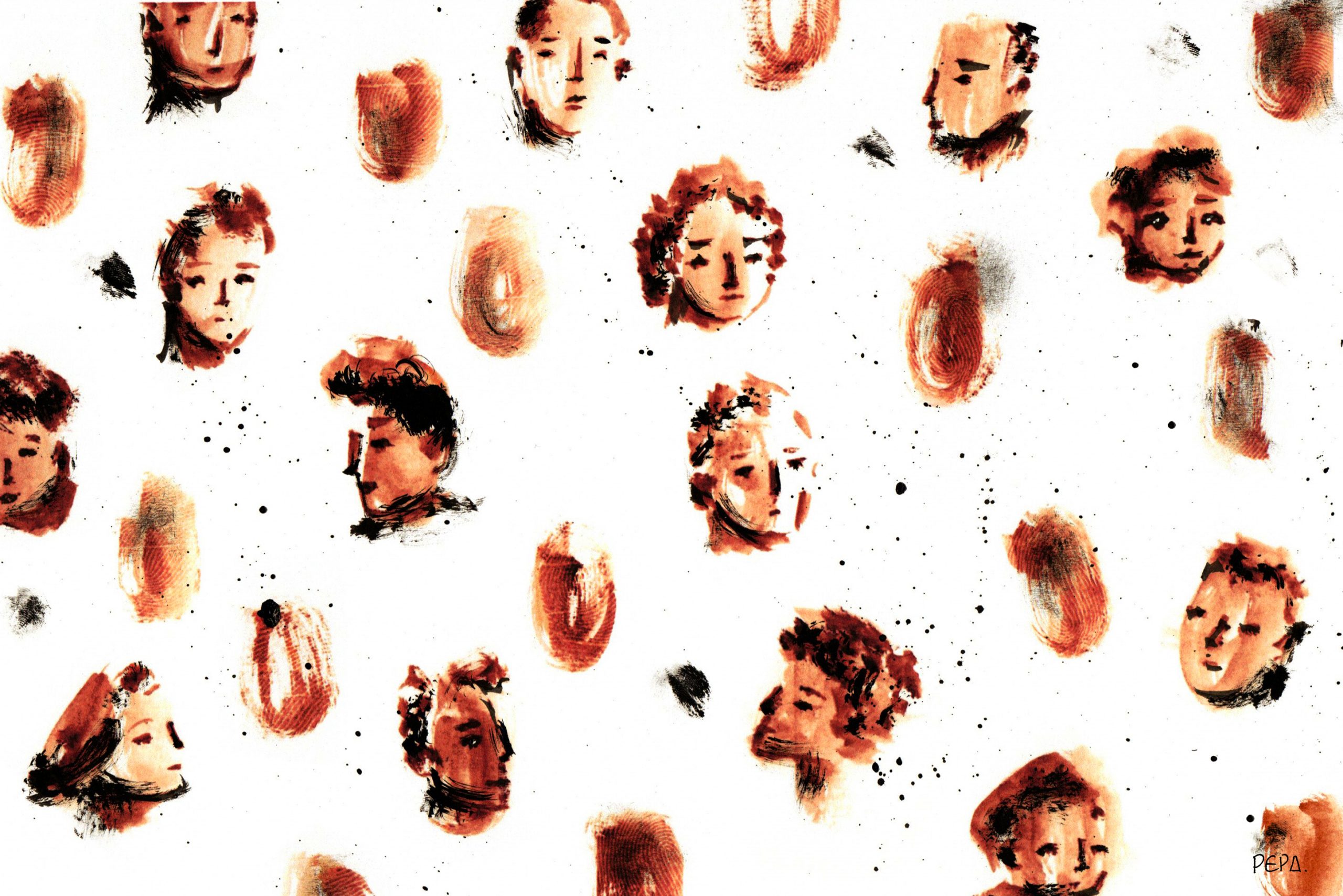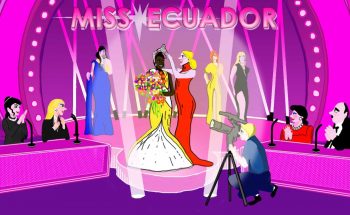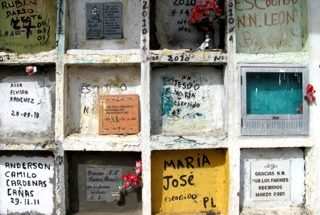
Translation – The Sentence
Share:
Translation by: Patrick Moseley
[Daniel Alarcón, host]: Hello, hello! I’m Daniel Alarcón, the Executive Producer of Radio Ambulante. Before this episode, I have an announcement, some news I’ve been wanting to share for a while: Radio Ambulante is going to do two live shows in September of this year.
Make sure you get the dates down: Tuesday, September 25th, in Washington, D.C. and Thursday the 27th, in New York. We’re very excited to share these stories with you in person. I promise it’s going to be a night of fun, moving and surprising stories. There’ll be a lot of laughter. And look, you can invite your friends who don’t speak Spanish because it will all translated.
I repeat: September 25th and 27th, in Washington, D.C. and New York. Tickets go out this Thursday, June 1st. Please, help us spread the word.
For more information and to buy tickets, visit our web page: radioambulante.org/envivo.
Thanks and see you soon!
[Juliana Deguis]: And maybe now, I can get a little scared because I walk down the street without documents. I walk on the street like that, and they ask me, and I say the same thing.
[Daniel]: This is Juliana Deguis Pierre. She’s 30 years old, she was born in the Dominican Republic and she doesn’t have papers. Maybe that would make more sense if she were in a different country and she were an immigrant. But she’s not.
[Juliana]: We sing the anthem like all Dominicans because we’re from here. We were born here. We were raised here.
[Daniel]: Welcome to Radio Ambulante from NPR. I’m Daniel Alarcón. Today we return to our archives to hear the story of a woman who refused to be a foreigner in her own country, and the State that wanted to exclude her. Luis Trelles brings us this story from Santo Domingo.
[Luis Trelles, producer]: When Juliana turned 18, she went to do what all Dominicans do when they become of age: she went to get her ID. It’s supposed to be a simple process. A matter of going to the nearest electoral office, presenting her Birth Certificate, filling out some paperwork and getting her picture taken. That’s it. In a month and a half the card comes in the mail.
[Juliana]: I never thought there was going to be a problem because people who are born here have the right to an ID card.
[Luis]: Or at least according to the Constitution. This is the exact wording: “All persons born in the territory of the Republic are Dominicans.” However, there is an exception to this rule: the children of foreigners in transit through the country. And that phrase refers to people like Juliana and her dad.
[Juliana]: He left Haiti, but after he came here he hasn’t been back since. He never went back.
[Luis]: Juliana’s dad left Haiti when he was 15, and he’s lived in the Dominican Republic for 49 years without ever having left. And it’s not that he crossed the border illegally in search of a better life.
[Juliana]: They didn’t come here alone. They came with people that go over to Haiti to get…to get thousands and thousands of them —of Haitians — to bring them here to the Dominican Republic to harvest sugarcane.
[Luis]: And it was the Dominican government itself that brought them to work in the sugarcane fields. That’s why it’s so hard to understand the status that the government gave to people like Juliana’s father, because after all, is someone who lives half their life in the same place really in transit?
But the bureaucrats that handled Juliana’s case when she first went to apply for her ID weren’t interested in the nuances of the Constitutions, they were fixated on other details: Her French last name, the color of her skin, where she was born and where she lives: Los Jovillos de Yamasá.
There are hundreds of places like it in the Dominican Republic. Los Jovillos is a settlement founded by sugarcane farmers: a small cluster of rustic houses tucked away in the countryside. In the Dominican Republic, these places are commonly known as “bateyes.”
Since Julaina was from the batey, the officials looked at her Birth Certificate and said:
[Juliana]: “Juliana, your Birth Certificate won’t work.” And I say, “why won’t my Birth Certificate work…If I was born here.”
[Luis]: No one could answer that question. But what is for sure is that she was denied her ID. They also kept her Birth Certificate.
And of course, Juliana isn’t the first person who has experienced this. In the Dominican Republic there are thousands of Haitian descendants in the same situation, even though no one knows exactly how many there are. Not even the Electoral Commission, which has denied ID to about 40 thousand people. Even so, a study by the government itself in 2012 indicated that the number is much higher: more than 200,000.
Juliana’s generation was born and raised very far from their parents’ country. For them, Haiti is a distant, foreign place and many of them don’t even speak Creole, the Haitian language.
[Juliana]: And here, you don’t even learn to speak Creole. So I know how to speak my language, the Dominican language.
[Luis]: For this new generation, getting an ID is a lottery. Some are lucky and get them without much trouble, since they know someone in the Registry Office or because they have a Spanish-sounding last name. Those who don’t normally give up and decide to live on the margins. Because without an ID there’s no other way to live.
[Juliana]: Your ID…you need it, here in the Dominican Republic, you need it work, to vote, to open a savings account, to declare your children…
[Luis]: Working, voting, saving… In other words, some of the basic rights of any citizen. Beyond her last name and her accent, there’s another factor that I mentioned a little bit ago: Juliana’s skin color.
There is a generalized sense that Haitians are the only black people in the country, which doesn’t make a lot of sense in the Dominican Republic, where black and brown people make up part of the basic mix of the population. But this prejudice against everything African runs very deep. When the authorities do raids to checks people’s papers, the first people they grab are black people.
[Juliana]: When I would leave the city, I would get scared. I would say: “If I run into the truck that pulls Haitians off the street, they’ll take me away.”
[Luis]: People who don’t have papers normally end up on immigration buses and are deported. And we’re not talking about just a few people: In 2012 alone more than 12,000 people were deported.
Without an ID, Juliana didn’t have a lot of opportunities to get a job legally, so she ended up doing domestic work in a house in the suburbs of the capital, earning half as much as a person with documents.
She lived informally, under the constant threat of deportation.
Effectively, Juliana was undocumented without having ever emigrated.
Juliana applied for an ID when she was 18 years old, not long after her first son Julio was born. When I spoke with her, early in 2014, she was 29 and had 3 more children since then. And you could see the frustration on her face. The day I went to visit her small house in Los Jovillos, she had large bags under her eyes… and she looked exhausted.
[Juliana]: Sometimes I say I feel tired. That I can keep going like this. I can’t have the life how it is because I want to work and give my children what I never gave them.
[Luis]: The day we met up, the two other kids, —one 4 and the other 6— were running around the little houses made precariously out of uneven cement blocks. The State doesn’t recognize their citizenship either. Public legislation allows them to stay in school up to the 8th grade; but after that it’s very hard to move onto the higher grades without papers. And the schools that do let them study can’t award them diplomas when they graduate. And that’s what worried Juliana the most: her children’s uncertain future.
[Juliana]: Because if I don’t fight, no one’s going to fight for me. I have 4 kids to raise. The youngest one, who’s 4, always tells me she’s hungry. And I would like to have a job so when my children say “I want this,” I can give it to them.
[Luis]: When Juliana finally found a little help, it wasn’t at a government office, but rather it was with this man:
[Genaro Rincón]: I’m Genaro Rincón and I have been…I’ve been a social activist for many years.
[Luis]: Beside being an activist, Genaro is a lawyer who specializes in human rights issues. After the 2008 elections, there were a lot of reports from people like Juliana, who had been denied the right to vote. Genaro and his organization conducted an investigation and in 2009, they arrived in Los Jovillos.
That was when he met Juliana and after that moment, they started working together. The first step in helping her was reclaiming her Birth Certificate.
Remember, the Electoral Commission had taken it from her when she was 18, when she went to apply for her ID. Without that document, Juliana ran the risk of being wrongfully deported.
And I’m not talking about an abstract concern.
[Juliana]: I came across them once. They came to my work. They stopped me and said: “Give me your passport.” And I said: “I don’t use a passport. I’m Dominican. I don’t use a passport.” “And what’s your name?” “Juliana.” “Where were you born?” “At the batey Los Jovillos de Yamasá.”
[Luis]: That time they let her go, but her lawyers knew she was very vulnerable.
[Genaro]: After that, we knew that Juliana and the others who didn’t have documentation could be, uh, arrested and deported to Haiti.
[Daniel]: And in order to keep that from happening, Genaro and other organizations decided to do something about it. After the break, the struggle to keep Juliana and thousands of others like her from being forced out of their own country.
We’ll be right back.
[Ad]: This NPR podcast and the following message are sponsored by Squarespace. Destiny is calling. It says you need a new website. Easily create a website by yourself with the help of 24/7 award-winning customer support. Head to Squarespace.com SLASH RADIO for a free trial. And when you’re ready to launch, use the offer code RADIO to save 10% off your first purchase of a website or domain. Keep dreaming. But make it a reality. With a website from Squarespace.
[María Hinojosa, host Latino USA]: This week on Latino USA, the story of the only registered Mexican-American Holocaust survivor, and how he risked everything to document the horrors he witnessed inside the Berga concentration camp. Find it on NPR One or wherever you get your podcasts.
[Planet Money host]: Planet Money tip number 17: Sometimes the most important things need a hype squad.
[Collage of voices]: Corporate income tax. Corporate income tax!
[Planet Money host]: Planet Money, a podcast about the economy, a very enthusiastic podcast about the economy.
[Daniel]: We’re back with Radio Ambulante. I’m Daniel Alarcón. Before the break, we met Juliana Deguis Pierre, and the difficulties she’s had being recognized as what she really is: a Dominican woman.
But it’s not so simple. Thousands of descendants of Haitians born in the Dominican Republic don’t have access to identifying documents. And that turns them into a population that can be deported at any moment.
Geraro Rincón, a lawyer specializing in human rights, started working to keep them from being deported.
Luis Trelles brings us the rest of the story.
[Luis]: Genaro looked for ways to keep that from happening. And he’s not the only one. Several organizations were doing similar work. Together, the institutions decided to look for help from international groups. And in February, 2013, they spoke before the Inter-American Commission for Human Rights in Washington.
The idea was that an international organization would pressure the Dominican State to prevent the deportations. Genaro presented 80 cases of vulnerable individuals. And they finally got what they were looking for.
[Genaro]: On June 10th, 2013, the Commission gave its ruling. In which they told the Dominican State, in their resolution, not to deport Juliana and the others.
[Luis]: Genaro and the rest of the lawyers continued with a two-part strategy: On one side, they presented cases at international institutions; an on the other, at local courts, where the issue made it to the highest court of Dominican Republic: The Constitutional Court.
What they asked was simple:
[Genaro]: We are only asking that the court give her her document, her Birth Certificate, and that she have the possibility of having access to her identification card, in order to then be able to participate in all spheres of civil life… like any other citizen.
[Luis]: The suit included hundreds of joint requests about the same issue: the legal status of children and grandchildren of Haitians born in the Dominican Republic.
Lawyers from several organizations were preparing themselves for a decision from the Constitutional Court, but they didn’t know which of the cases would be chosen.
[Genaro]: We knew that…since we ha…had applied so much pressure at the national level, the answer had to be a function of the cases we had, but we didn’t know it was going to be Juliana.
[Luis]: And that was what happened. Even though according to Genaro, it wasn’t by chance either.
[Genaro]: How did they pick it? Well, of all the cases, the Constitutional Court knew that hers was the weakest, that had…the worst documentation and they picked it.
[Luis]: The judges selected Juliana’s case strategically. They wanted to end the debate over the descendants of Haitians once and for all. And on September 23, 2013, they gave their ruling.
(NEWS SOUNDBITE)
[Journalist]: The Dominican Constitutional Court’s decision to strip thousands of children of Haitians born in the Dominican Republic of their nationality creates a humanitarian crisis and puts many of them at risk of being deported.
[Luis]: No one expected such a comprehensive sentence.
[Genaro]: The Courts sentence says that all Dominicans born between 1929 and the 2013 —in other words: children of immigrants like Juliana — don’t have the right to a nationality.
[Luis]: In theory, the sentence affected the children of immigrants from all countries. But, in practice, the most disadvantaged were the descendants of Haitians.
And at the middle of all this was Juliana, whose case resulted in the sentence. Even though the truth is she didn’t even really know what was happening. She had gone months without having contact with her lawyers.
[Juliana]: I barely spoke with them because I was working. I didn’t have time.
[Luis]: And that’s why she didn’t even know what was at stake in the Court’s decision. The same day that the ruling was announced, the first reporter showed up at Juliana’s work.
[Juliana]: And she said to me: “Juliana, the sentence has been delivered, saying that you will not be issued an ID and that you are not Dominican.” And then I felt very sad. I started to tear up. I told her: “No, that can’t be because I am Dominican because I was born here. I was born here.”
[Luis]: After the ruling, Juliana got a lot of media attention that she wasn’t expecting. She appeared in newspapers and TV reports constantly. And that caused a lot of problems for her at work.
[Juliana]: Because if that sentence hadn’t come out, I could be working. But since that sentence came out, the owners of the house, seeing me on TV, seeing me wherever, and then no one…will take you into their home because they say “Why are you on TV?” “Why are you doing this?”
[Luis]: A week after the news came out, she was fired.
Things weren’t going well in the batey either. People who had been her neighbors her whole life were blaming her for the sentence.
[Juliana]: Yes, I have received a lot of criticism. They think that my situation is going to affect them because of my case. That’s been there for a long time. What happened is, like they say, that bomb hadn’t gone off. And now is when the bomb went off. And they think it’s because of me.
[Luis]: But not everyone criticized her. Some people created a campaign for the rights of descendants of Haitians and made Juliana a representative.
[Genaro]: We are all Juliana. It doesn’t matter if we are, uh, descended from Haitian immigrants or Dominicans. It doesn’t matter.
[Luis]:The campaign included open letters in newspapers, protests, talks in the bateyes. In time, Juliana became an inescapable figure in the Dominican media.
(NEWS SOUNDBITE)
[Report]: The sentence was the result of an appeal for constitutional protection filed by a young woman of Haitian descent Juliana Deguis when she tried to claim her Identification Card and instead had her Birth Certificate confiscated.
[Luis]: The Court left the people affected only one option: forget Dominican citizenship and undergo the naturalization process. That means that the government would register the descendants of Haitians as foreigners.
[Juliana]: The Court says I have to naturalize, but I say no. I’m not going to do that. Why not? Because I’m from here, from the Dominican Republic. Since I’m not going to do that, no one will.
[Luis]: With that challenge, Juliana is setting herself against a whole sector of the population with a lot of political power: the nationalists. To them, Juliana wasn’t just a foreigner, but something more: with every day she challenged the sentence, she was also becoming a criminal.
[Juan Miguel Castillo]: The law wasn’t made for Ms. Deguis, or any person in her…in a similar situation to like or not to like. It was made to be followed.
[Luis]: This is a Juan Miguel Castillo Pantaleón, a Dominican lawyer and jurist who has written several laws on immigration in the past. He is one of the harshest critics of Juliana’s campaign.
[Juan Miguel]: She should do what the law and institutions order. Challenging them and challenging the authorities is not what is going…going…going to be most advisable for this person.
Why persist in something that simply discriminates against this person?!? Because the only person who is being discriminatory is Juliana Deguis! And think about it: her children!
[Luis]: Refusing to register as a foreigner would turn Juliana into a ghost resident. And that is a big risk for someone who is fighting to remain in the country that they consider to be their own.
When I visited her in February, 2014, 5 months after the sentence, Juliana was still in the same legal limbo.
[Juliana]: What can I do to get my ID? Continue fighting like I am. I am Juliana Deguis Pierre. I am the…the one from the sentence. We won’t despair, we are going to fight until this whole problem is solved.
[Genaro]: She’s a person who doesn’t exist, legally speaking. She is a vulnerable person, a person who’s permanently at high-risk. And if she doesn’t have the right to…a nationality, and she doesn’t have any other na…other option of being another nationality, what will she become? Stateless.
[Luis]: Remember we aren’t just talking about one woman’s story, but tens of thousands of people in the same legal void. People who only know one country: the Dominican Republic. And who now, because of a legal ruling, have suddenly become people without a country
Meanwhile, the international pressure continues. The United Nations, the US State Department and the Community of Latin American and Caribbean States came out against the sentence. In terms of commerce, some companies and international organizations canceled conventions and events in the Republic, affecting the local tourism industry.
And after ten months of protests and international pressure, the Dominican President Danilo Medina gave in and passed a law that recognized the nationality of some descendants.
The ones who received the benefits of this law were people like Juliana, who already had a Birth Certificate when they began applying for their ID.
In August of 2015, Juliana finally was able to go to an Electoral Commission office and reclaim her papers. The media which had so closely followed her case, documented this moment.
(NEWS SOUNDBITE)
[Journalist]: Juliana presented herself to the Commission of the district accompanied by her lawyers. The process of issuing her Identification Card lasted about 15 minutes.
[Luis]: And I admit I celebrated that.
It was exciting to see her smiling for the first time on TV. And even though it was a happy ending for Juliana, that doesn’t change the situation of those who don’t have any kind of documents or legal status. And there are many of them.
Some organizations estimate that there could be more than 50,000. The reason is simple: not everyone born in the bateyes gets a Birth Certificate. And for those who don’t have an Birth Certificate, the Dominican nationality remains inaccessible.
And this presidential decree doesn’t change the prejudices in Dominican society, like those of this woman who was recorded at a nationalist protest in late 2014.
(VIDEO SOUNDBITE)
[Nationalist woman]: Traitors! Ungrateful! Dirty! Sick! Disgusting!…Black! Either they go peacefully or we stone them. Or shoot them!
[Luis]: But she’s not alone, of course. You hear sentiments like this every day in Santo Domingo. It has to do with a deep-seated xenophobic and racist rejection, though there is also a useless resentment. There are already several generations of descendants of Haitians who are part of the Dominican Republic.
And they’re not going anywhere.
[Daniel]: Since we aired this story for the first time in 2015, Juliana managed to get her passport and has traveled to the Netherlands and to Haiti in order to alert the international community about the situation of descendants of Haitians like her. She still lives in Los Jovillos de Yamasá and has gotten a job as a domestic worker in the capital.
Many others have not been so lucky. According to Reconocido [lit. “recognized”], an organization that helps the descendants of Haitians, a normalization plan for people like Juliana has not had the expected effect. More than 40,000 people still have not been able to resolve their cases.
That could have serious consequences, like deportation. A report from Human Rights Watch that came out in 2016 documented the cases of dozens of people who were in Haiti with no documentation whatsoever and said that they were born in the Dominican Republic.
Luis Trelles is a producer with Radio Ambulante and he lives in New York. This story was edited by Camila Segura and me. Mixing is by Andrés Azpiri.
Special thanks to Manuel Dandré, Juan Alberto Vill and the the journalist Panky Corcino for their help.
The rest of the Radio Ambulante team includes Silvia Viñas, Jorge Caraballo, Patrick Moseley, Ana Prieto, Barbara Sawhill, David Trujillo, Elsa Liliana Ulloa and Luis Fernando Vargas. Carolina Guerrero is the CEO.
Radio Ambulante is produced and mixed on Hindenburg Pro.
Learn more about Radio Ambulante and this story on our website: radioambulante.org. Radio Ambulante tells the stories of Latin America. I’m Daniel Alarcón. Thanks for listening.





